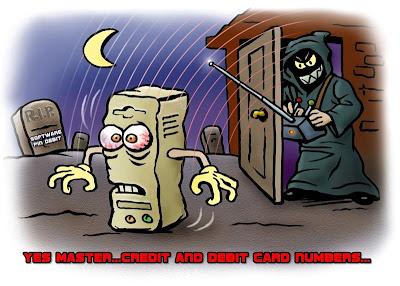 Editor's Note: Financial Transactions CANNOT be done on the web because the "wicked web" hackers weaved have made it unsafe. HomeATM is "hands down" doin' it right, by doin' outside the browser.
Editor's Note: Financial Transactions CANNOT be done on the web because the "wicked web" hackers weaved have made it unsafe. HomeATM is "hands down" doin' it right, by doin' outside the browser. You would think the information below would alarm people. You would think the information below would paint a picture that the web is not safe. You would think that. Wouldn't you?
The conjunction of technologies and the monetizing of hacking haveresulted in a web environment where no websites, legitimate or not canbe trusted.
Spam volumes have increased 141 percent since March, continuing the longest streak of increasing spam volumes ever, according to McAfee's Q2 Threats Report. The report also highlights the dramatic expansion of botnets and the threat from Auto-Run malware.Analysis of Internet threats in July 2009 shows the number of viruses is at its highest so far this year, peaking at around 12 viruses per customer per hour.
- The number of viruses sent over email has increased by 300 per cent in the last three months, according to Network Box.
More than 14 million computers have been enslaved by cybercriminal botnets, a 16 percent increase over last quarter’s rise. The report confirmed McAfee’s first quarter prediction that the surge in botnet growth would send spam levels to new heights, surpassing their previous peak in October 2008 before the takedown of the spam-hosting ISP McColo.Auto-Run malware, which exploits Windows’ Auto-Run capabilities, does not require any user clicks to activate, and is most often spread through portable USB and storage devices. The rate of detection surpasses even that of the infamous Conficker worm by 400 percent, making Auto-Run the number one piece of malware detected around the world.
- McAfee researchers also found that, over the course of 30 days, Auto-Run malware had infected more than 27 million files.
Botnets (also called zombie armies or drone armies) are networks of compromised computers infected with viruses or malware to turn them into “zombies” or “robots” – computers that can be controlled without the owners’ knowledge. Criminals use the collective computing power and connected bandwidth of these externally-controlled networks for malicious purposes and criminal activities, including, inter alia, generation of spam e-mails, launching of Distributed Denial of Service (DDoS) attacks, alteration or destruction of data, and identity theft.
- Fourteen million additional computers have been turned into botnets or this quarter.
As the number of bots continues to grow, malware writers have begun to offer malicious software as a service to those who control botnets. By exchanging or selling resources, cybercriminals distribute new malware to wider audiences instantaneously. Programs like Zeus - an easy-to-use Trojan creation tool - continue to make the creation and management of malware even easier.
- That averages to more than 150,000 computers infected every day, or 20 percent of the personal computers bought daily (Source: Gartner 2009).
I hate having to "type cast"...but anyone and everyone who types their card numbers into a box on a website will have those numbers swiped.
If Your Card Data is Going to Be Swiped, Shouldn't You be Doing the Swiping?
If Your Card Data is Going to Be Swiped, Shouldn't You be Doing the Swiping?



![Reblog this post [with Zemanta]](http://img.zemanta.com/reblog_c.png?x-id=f8933d8e-d17b-4e40-ac3e-41e4bc73c80c)
No comments:
Post a Comment